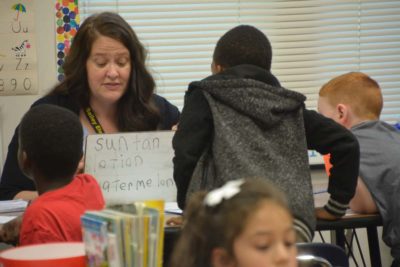

Senate President Pro Tempore Phil Berger, R-Rockingham, read with interest about Transylvania County Schools’ shift to align reading instruction with how scientific research says kids learn to read. Some of the district’s plans reminded him of a state law he tried pushing through two years ago.
“I feel good for Transylvania County and for the students in Transylvania County,” he said. “Where my frustration level is raised a little bit is … we certainly don’t have the outcomes that I think would be better if we had more districts doing the same. … We’ve not seen any mass movement in this direction.”
Berger intends to change that in this year’s legislative session. He plans to re-introduce legislation similar to 2019’s Excellent Public Schools Act.
That bill would have modified the state’s Read to Achieve law. Notably, it would have required that “early literacy training be evidence-based, systemic and explicit, based on the science of reading.”
Berger worked with former State Board of Education member J.B. Buxton and a team of literacy experts to draft that proposed law. The legislature ratified it, but it was vetoed by Gov. Roy Cooper, who cited a lack of confidence in the leadership then at the Department of Public Instruction.
DPI leadership has changed with the election of Catherine Truitt as state superintendent. And Berger says he thinks he can garner support in this General Assembly for a similar law.
Berger has not yet worked out the specifics. He did say he expects to consult some of the advocacy groups and experts who helped last time.
“What I would expect us to do is try to replicate, in some respects, the broad support that we had from various groups that have an interest in early childhood literacy and elementary school literacy,” Berger said. “And I think with that kind of support from outside of the legislative building, I would expect that we would be able to see a good bit of support within the legislative building when legislation goes forward.”
Some of that support from outside comes from the UNC System. Most public school teachers in the state come from the 15 educator preparation programs within the UNC System.
In April, the UNC Board of Governors passed a resolution to develop a framework for literacy instruction for teacher candidates by next year. The resolution requires a framework that “ensures that teaching candidates receive explicit, systematic, and scaffolded instruction in the essential components of reading.”
“I will say that I’ve had conversations with [UNC System President] Peter Hans and with folks at the university system about finding ways to enhance the instruction of those teachers that are currently being trained in our universities,” Berger said, “and also in terms of trying to develop and look at ways to take care of some of that with the required continuing education.”
Further support comes from the North Carolina Center for the Advancement of Teaching (NCCAT). Established by the General Assembly as part of the UNC System, NCCAT provides professional development opportunities for state educators. This year, NCCAT is offering both an introductory course and a deeper dive into the science of reading.
Reading instruction became a centerpiece in Berger’s lawmaking agenda when he pushed for Read to Achieve in 2012. But the law has not produced gains in reading proficiency.
In 2013-14, the first year Read to Achieve was in effect, 60.4% of third-graders scored proficient on state reading exams. In 2018-19, that number was 57.3%, ticking up 1% from the prior year. No data are available for 2019-20 because the state waived end-of-grade testing due to COVID-19.
Berger candidly acknowledges Read to Achieve’s shortcomings, and he won’t defend it just because his name is attached to it. He wants to fix it, he said.
After legislative reform failed in 2019, Berger said, he worked with members of the State Board of Education and staff inside the Department of Public Instruction to push reform through policy.
The State Board and DPI spent much of 2020 working on just that. The board convened a literacy task force whose report helped inform and support the work of a B-12 Literacy Committee at DPI.
In September, DPI drafted and the State Board adopted revisions to the state’s Comprehensive Plan for Reading Achievement. The plan calls for some of the initiatives in Berger’s 2019 legislation. But DPI and State Board policy is not the same as a mandate, leaving ultimate control with local school units. That’s why Berger says he wants to revisit legislative solutions.
The State Board and DPI seem poised to continue policy support for science-backed approaches to reading instruction.
Truitt advocated for the science of reading during her campaign for superintendent. And this month, State Board Chair Eric Davis listed it as the second of his three legislative priorities.
“We need to double down on literacy,” he said. “Every academic subject depends on our students’ ability to read. We’ve got to get on the same page with our partners across the districts around the science of reading and make a concerted effort to not only close the gaps, but also accelerate students’ literacy skills.”





